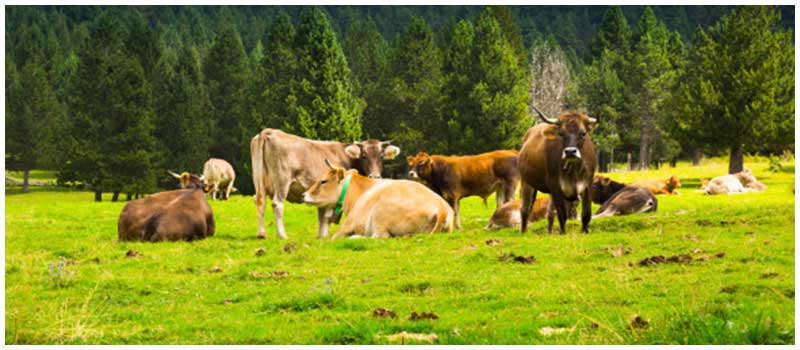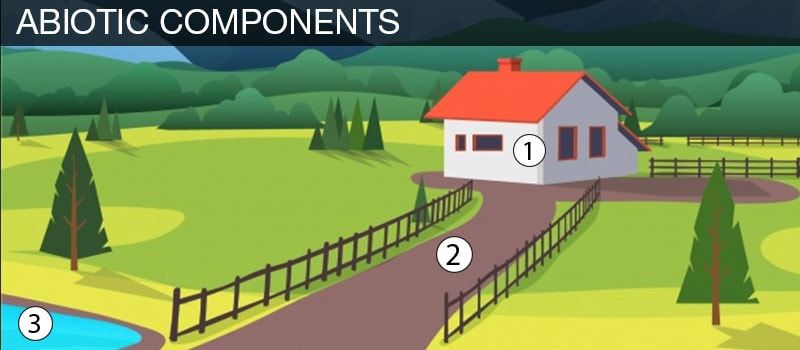Table of Contents

What is Ecology?
Ecology is a branch of science, including human science, population, community, ecosystem, and biosphere. Ecology is the study of organisms, the environment and how the organisms interact with each other and their environment. It is studied at various levels, such as organism, population, community, biosphere, and ecosystem.
Ecologist’s primary goal is to improve their understanding of life processes, adaptations and habitats, interactions and biodiversity of organisms.
Let us have a detailed look at the ecology notes provided here and explore the concept of ecology.
Biotic and Abiotic Factors
The main aim of ecology is to understand the distribution of biotic and abiotic factors of living things in the environment. The biotic and abiotic factors include the living and non-living factors and their interaction with the environment.
Biotic components

Biotic components are living factors of an ecosystem. A few examples of biotic components include bacteria, animals, birds, fungi, plants, etc.
Abiotic components

Abiotic components are non-living chemical and physical factors of an ecosystem. These components could be acquired from the atmosphere, lithosphere, and hydrosphere. A few examples of abiotic components include sunlight, soil, air, moisture minerals, and more.
Living organisms are grouped into biotic components, whereas non-living components like sunlight, water, topography are listed under abiotic components.
Types of Ecology

The diagram showing different Types of Ecology
Ecology can be classified into different types. The different types of ecology are given below:
Global Ecology
It deals with interactions among earth’s ecosystems, land, atmosphere, and oceans. It helps to understand the large-scale interactions and their influence on the planet.
Landscape Ecology
It deals with the exchange of energy, materials, organisms, and other products of ecosystems. Landscape ecology throws light on the role of human impacts on the landscape structures and functions.
Ecosystem Ecology
It deals with the entire ecosystem, including the study of living and non-living components and their relationship with the environment. This science research how ecosystems work, their interactions, etc.
Community Ecology
It deals with how community structure is modified by interactions among living organisms. Ecology community is made up of two or more populations of different species living in a particular geographic area.
Population Ecology
It deals with factors that alter and impact the genetic composition and the size of the population of organisms. Ecologists are interested in fluctuations in the size of a population, the growth of a population and any other interactions with the population.
In biology, a population can be defined as a set of individuals of the same species living in a given place at a given time. Births and immigration are the main factors that increase the population and death and emigration are the main factors that decrease the population.
Population ecology examines the population distribution and density. Population density is the number of individuals in a given volume or area. This helps in determining whether a particular species is in endanger or its number is to be controlled and resources to be replenished.
Organismal Ecology
Organismal ecology is the study of an individual organism’s behaviour, morphology, physiology, etc. in response to environmental challenges. It looks at how individual organisms interact with biotic and abiotic components. Ecologists research how organisms are adapted to these non-living and living components of their surroundings.
Individual species are related to various adaptations like physiological adaptation, morphological adaptation, and behavioural adaptation.
Molecular Ecology
The study of ecology focuses on the production of proteins and how these proteins affect the organisms and their environment. This happens at the molecular level.
DNA forms the proteins that interact with each other and the environment. These interactions give rise to some complex organisms.
Importance of Ecology
The following reasons explain the importance of ecology:
Conservation of Environment
Ecology helps us to understand how our actions affect the environment. It shows the individuals the extent of damage we cause to the environment.
Lack of understanding of ecology has led to the degradation of land and the environment. It has also led to the extinction and endangerment of certain species. For eg., dinosaurs, white shark, mammoths, etc. Thus, the study of the environment and organisms helps us to protect them from any damage and danger.
Resource Allocation
With the knowledge of ecology, we are able to know which resources are necessary for the survival of different organisms. Lack of ecological knowledge has led to scarcity and deprivation of these resources, leading to competition.
Energy Conservation
All organisms require energy for their growth and development. Lack of ecological understanding leads to the over-exploitation of energy resources such as light, nutrition, and radiation, leading to its depletion.
Proper knowledge of ecological requirements prevents the unnecessary wastage of energy resources, thereby, conserving energy for future purposes.
Eco-Friendliness
Ecology encourages harmonious living within the species and the adoption of a lifestyle that protects the ecology of life.
Examples of Ecology
Following are a few examples of ecology:
Human Ecology
It focuses on the relationship between humans and the environment. It emphasizes the impact human beings have on the environment and gives knowledge on how we can improve ourselves for the betterment of humans and the environment.
Niche Construction
It deals with the study of how organisms alter the environment for the benefit of themselves and other living beings. For eg, termites create a 6 feet tall mound and at the same time feed and protect their entire population.
Also Read: Biodiversity
To explore more about what is ecology, importance, and types of ecology, keep visiting the BYJU’S website or download the BYJU’S app for further reference.
Frequently Asked Questions
What is ecology?
Ecology is the branch of science that deals with the relationship of organisms with one another and with their physical surroundings.
What are the different levels of ecology?
The different levels of ecology include- organisms, communities, population and ecosystem.
What are the different types of ecology?
The different types of ecology include- molecular ecology, organismal ecology, population ecology, community ecology, global ecology, landscape ecology and ecosystem ecology.
How are ecology and evolution related?
Ecology plays a significant role in forming new species and modifying the existing ones. Natural selection is one of the many factors that influence evolutionary change.
Who devised the word ecology?
Ecology was first devised by Ernst Haeckel, a German Zoologist. However, ecology has its origins in other sciences such as geology, biology, and evolution among others.
What is habitat ecology?
Habitat ecology is the type of natural environment in which a particular species of an organism live, characterized by both physical and biological features.
What is a niche?
An organism free from the interference of other species and can use a full range of biotic and abiotic resources in which it can survive and reproduce is known as its fundamental niche.



0 Comments